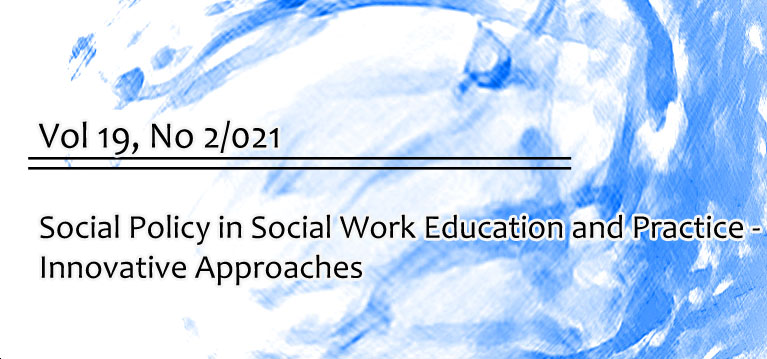Call for Special Issue (PDF)
Reviewer List 2025 (PDF)

The ‘London Edinburgh Weekend Return Group’, a group of public sector workers in the UK, have published in 1979 their Discussion Notes for Socialists under the title In and Against the State. As state workers, the members of the group asked whether they can contribute to a radical reform of the state – or they will inevitably promote the reproduction of the existing (capitalist) state. The question of promoting a political transformation from an ‘internal’ position in public sector agencies is even more evident 40 years later. The welfare states and as part of it, the (public) social sector, have been reorganised and newly conceptualised in fundamental ways in the last decades. So, in the existing context of managerialism, as a major piece of these ‘new’ (investment or activation) states, social service workers in general and social workers in particular, are confronted with their position of being part of state regulation – and being regulated themselves. Therefore, the question of dealing with ‘the political’ is of essential, even existential importance in the current days.
Social Work & Society is more than pleased to present a SW&S.Special Issue in our second issue of 2021 on Social Policy in Social Work Education and Practice – Innovative Approaches, edited by by Sarah P. Lonbay from Sunderland University (UK) and Marija Stambolieva from Osnabrueck University of Applied Sciences (GER).
Dealing with ‘the political’ should be a ‘natural’ part of social work education – and practice. This premise is discussed in the current SW&S.Special Issue in five papers from different respective European authors. Reeli Sirotkina & Kersti Kriisk (EST) reflect in their paper the Insider-outsider view of social work curricula in Estonia – and raise the question: Should one competence of future social workers be policy literacy? In his article Social Work and policy practice: group reflection and policy inquiry Tony Evans (UK) argues for a structured policy reflection in social work education. Lluis Francesc Peris Cancio (IT) is also dealing with The need to improve social work students’ skills as future social policy actors in his paper, where he shows experiences and prospects in undergraduate training. Social work education should include a Pedagogy of the protest – so teach social workers about collective action and the social policy context. This is the main argument of Mariam Zaidi (US) & Håvard Aaslund (NOR). In their closing article Joachim Thönnessen & Christiane Westerveld (both GER) take a look on Professionalization in low-threshold drug aid – betwen managerialism and practitioner knowledge, by discussing possible bridges between the caring aspect of social work and managerialistic approaches.
SW&S Forum
The current SW&S.Special Issue is supplemented by three very interesting papers on different aspects of social work and social policy in the SW&S.Forum. Immigrants’ experiences of the importance and value of work in Norway are focused by Reidun Ims (NOR) to discuss the Implications for social work. Amy Castro, Chenyi Ma, Claudette Grinnell Davis & Meagan Cusack (all US) look on Hope, Mattering, and Pathways Towards Economic Agency among Financially Marginalized Adults. And last but not least, the question of Responding to New Social Risks is reflected by Paweł Poławski (POL) in his view on The Southernization of Social Welfare in Poland?
Hopefully the new issue of Social Work & Society will be a pleasant read for all of you.
The SW&S Co-Ordinating Office
Call for Special Issue (PDF)
Reviewer List 2025 (PDF)